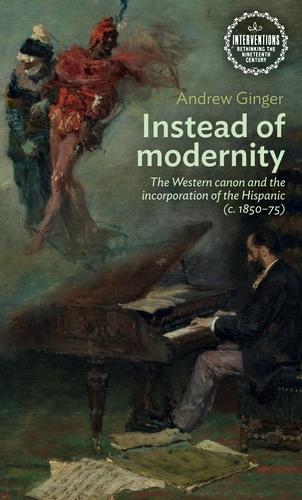
Instead of Modernity: The Western Canon and the Incorporation of the Hispanic (c. 185075)
(Hardback)
Available Formats
Publishing Details
Instead of Modernity: The Western Canon and the Incorporation of the Hispanic (c. 185075)
By (Author) Andrew Ginger
Manchester University Press
Manchester University Press
13th October 2020
United Kingdom
Classifications
General
Non Fiction
History of art
Cultural studies
Social theory
809.93352968
Physical Properties
Hardback
320
Width 170mm, Height 240mm, Spine 27mm
916g
Description
This book revisits the claim that a key dimension of cultural modernity - understood as a turn to the autonomy of the signs and the erasure of the 'face of man' - arose in the mid-nineteenth century. It presents an alternative to that obsession, focusing instead on the aesthetic appreciation of forms through which connections are realised across place and time. The book is one of few to offer a comparative approach to numerous major writers and artists of this period over diverse countries. Specifically, the comparative approach overcomes the constitutively ambiguous relation between the modern and the Hispanic. The Hispanic is often imagined as at once foundational for and excluded from the modern world. Its reincorporation into the story of the mid-century unsettles the notion of modernity. The book offers instead an experiment in writing, tracing commonalities across place and time, and drawing on mid-century expressions of such likenesses. -- .
Reviews
'Instead of Modernity certainly performs an important service by reincorporating the Hispanosphere into modern culture, and by upending simplistic understandings
of modernity in turn. The world it portrays is certainly Quixotic, but in the manner
stressed by Borgess Pierre Menard: as something more fragmentary, more
subtle, more incongruous than previously imagined and infinitely richer for it.'
Romance, Revolution & Reform
'From this new vantage point, both temporality and the concept of modernity are blown out of the water ... [the] broad outlook transcends the limits of what we understand by Hispanism ... and in this quest for the shared and the disruptive, [Ginger] works with pieces of art, turns of language, figures of speech, images from the past and the present, on a surface that as soon opens out to an infinite horizon as it shrinks to a specific time and place.'
Jesusa Vega, Anales de Historia del Arte
Author Bio
Andrew Ginger is the Dean of Faculties at the New College of Humanities at Northeastern
